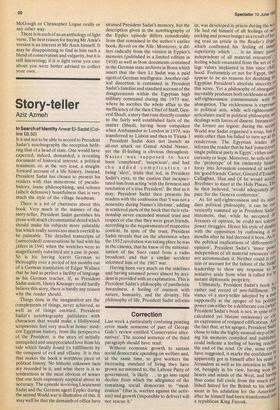Correction
Last week a particularly confusing printing error made nonsense of part of George Gale's review entitled 'Conservative alternatives'. The second sentence of the third paragraph should have read: Without economic growth to sustain social democratic spending on welfare and, at the same time, to give workers the increasing standard of living they have grown accustomed to, the Labour Party of government, Is likely . . . to go into rapid decline from which the allegiance of the remaining social democrats to "moderation" (that is, warfare against the activists) and growth (impossible to deliver) will not rescue it.'
us, was developed in prison during the viae; He had rid himself of all feelings of selr seeking and power hunger as a result of he ing read an article in the Reader's Dig° which confirmed his 'feeling of innate superiority which . . . is an inner powe! independent of all material resources', feeling which emanated from the set of va' lage values implanted in him since child' hood. Fortunately or not for Egypt, the appear to be no reasons for doubting tile Egyptian President's absolute sincerity :3° this score. Yet a philosophy of abnegauge inevitably produces both recklessness and$ self-righteousness commensurate with thed abnegation. The recklessness is expresse in political acts, while self-righteousnl articulates itself in political philosophy an( dealings with forces of dissent. Instances°, the former are legion: during the secoau, World war Sadat organised a coup, but 81i units other than his failed to turn up at the rendezvous. The Egyptian leader alse
informs the reader that he had 'joined evell single political party in Egypt', either curiosity or hope. Moreover, he tells us the'
the 'prototype' of his eminently hister,/e
foray into Jerusalem consisted of invita his 'good friends' Carter, Giscard d'EstainP, Callaghan, Hua and (if he would accePt' Brezhnev to meet at the Holy Places. TO
he then believed, 'would adequately Pre'
pare for the Geneva conference'.
As for self-righteousness and its attea: dant political philosophy, it can be CO veniently summed up in President Sadat,; statement, that, while he accepted eln: ferences of opinion, he could not tolerall power struggles. Hence his style of deallq with the opposition by outlawing it te'' months after he had decreed it born. As f°rf the political implications of 'differences c't opinion', President Sadat's 'inner pove, independent of all material resources' can, not accommodate it. Neither could it cog: tain or account for the failure of the Isrge!' leadership to show any response to tits, initiative aside from what is called for 13) instant diplomatic propriety. Ultimately, President Sadat's book ist., rather sad record of non-fulfilment. Ti stance of a story-teller adopted by a 101$11 supposedly at the apogee of his politic: It power can either be a deliberate con (whle,s President Sadat's book is not, in spite oil' calculated yet blatant omissions)' or alsed an expression of resigned edifications. Al11 the fact that, at his apogee, President SO°, chose to take the highly unusual step of hay, ing his memoirs compiled and publisheeti could indicate a feeling of having reach°,,, the end of the road. Or else, some have suggested, it marks the confidence i! apparently got in himself after his stunt °If Jerusalem as well as his intention to linguee on, benignly in his view, having won t,°, hearts and minds of the West, and had, thus come full circle from the much Pub, lished hatred for the British to his atones ment in his adulation for the Amerial„ after he himself had been transformed a republican King Farouk.


































 Previous page
Previous page